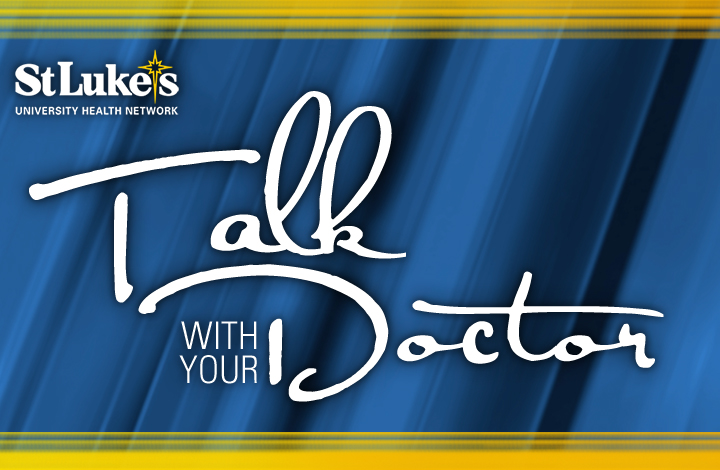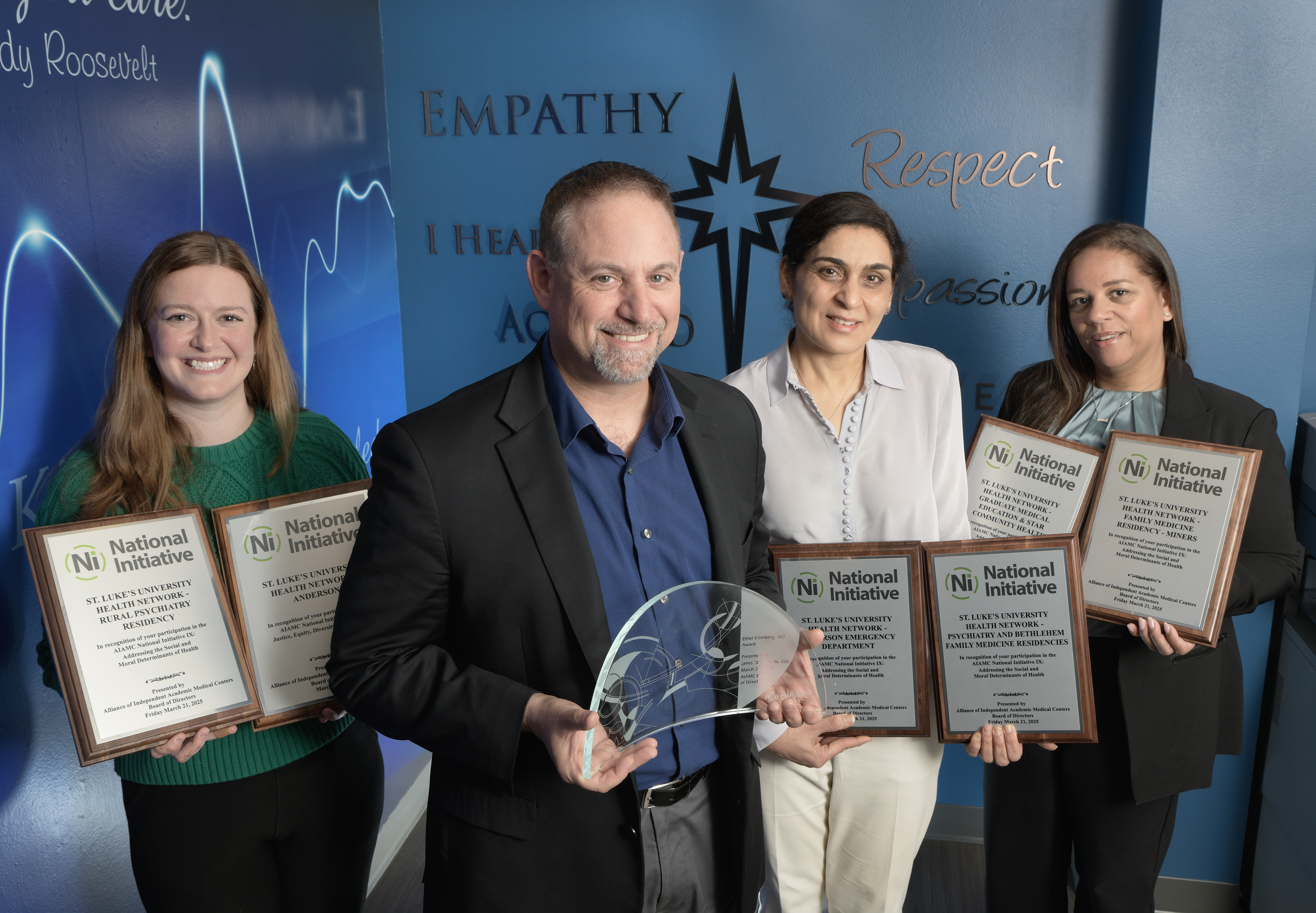St. Luke’s Therapist Uses His Interest in “Geeky” Subjects to Treat Children and Teens
July 13, 2021

Jason Frei Recently Had His Entry Included in a Deck of Geek Therapy Cards
St. Luke’s therapist Jason Frei uses his inner geek to connect with his young patients. Jason is certified in an innovative type of therapy, called geek therapy, which references video games, comic books, hero shows and anime, to encourage interaction and build trust. One of his ideas was accepted for a recently produced Geek Therapy Card Deck used by behavioral health professionals, teachers and parents to enhance communication with children and teens.
Jason, St. Luke’s Clinical Coordinator, School Based Behavioral Health (YESS!), has been working on becoming certified in geek therapy for about a year. But he has used topics considered by many people to be “geeky” for about 25 years. Describing himself as a 100% geek, Jason has been interested in fantasy and science fiction for as long as he can remember. His particular interest, or fandom, is comic books. Although more mainstream recently due to the popularity of Marvel’s and DC Comics’ movies and TV shows, for many years comic books were a refuge for kids who were picked on by their peers. They identified with the heroes, many of whom had hard lives, were bullied or who were outsiders.
Jason talks about characters and story lines to engage his patients and help them gain awareness about their own emotions and practice self-control. For example, his suggestion that was accepted for the card deck designed by Geek Therapeutics – the organization that provides certification for Geek Therapy – says:
Using the cards, Jason allows patients to consider the concept and think about how they might react in a stressful situation. He shared an example of how it can work. During a recent therapy session, a patient, who often feels bullied, told Jason that he had been playing a tabletop game with his family when he became angry because his sister picked on him and called him a loser. Normally the teen would have flipped the board. This time, however, he went to his room and envisioned putting on this armor and seeing his sister’s words bouncing off the breastplate. It calmed him down enabling him to return to the game.
“He said to his sister, ‘Your words don’t have any effect on me. Let’s finish the game and I’ll show you who the loser is.’ He won the game, but more importantly, he controlled his anger,” Jason says.
The cards, which are available on Amazon.com for about $20 a deck, contain teachings, ideas for contemplation and exercises. It’s suggested they be used as conversation starters, topics for discussion and as ways to drive points home and shift thinking patterns. The cards are separated into the following topics:
- Video Games
- Movies/Television
- Anime
- Pop Culture
- Superheroes
- Comics
- Self-Care topics steeped in geek culture.
Geek therapy allows kids to relate to their therapist in a non-threatening way and teaches them skills that they’ve already seen played out in the video games, movies and TV shows they watch. One of Jason’s favorite characters is the Incredible Hulk, he says, because anger is an emotion that we all understand. When Dr. Bruce Banner becomes angry, he turns into his alter ego. As the Hulk, he destroys everything around him including his relationships and his friends. When he turns back into Dr. Banner, he must deal with the consequences of his anger, just like Jason’s patients do. In the Avengers movies, the Hulk comes out as one of the stronger characters by bringing his intelligence and brute strength together, and is helped by another character, Black Widow, who shows him kindness.
The cards are not only for professionals but are also useful for parents, he says. When dealing with children and teens, Jason advises parents to find out what their kids like and allow them to teach you about it.
“If your kids play video games, have them teach you how to play, and play with them,” he says. “When you’re playing, they’re going to open up so much more to you. It’s going to expand the communication that you have. Most of the kids I talk to say their parents don’t understand them. Take the time to connect with your kids on their level, it’s going to make your relationship so much better.”
St Luke’s University Health Network is offering the YESS! School-Based Therapy program in many area school districts. Please talk to your school guidance counselor for more information. School officials wanting to learn more about the YESS! School-Based Therapy Program should contact our Practice Administrator at 484-822-5712.
***
Media Contact:
Sam Kennedy, Corporate Communications Director, 484-526-4134, samuel.kennedy@sluhn.org
About St. Luke’s
Founded in 1872, St. Luke’s University Health Network (SLUHN) is a fully integrated, regional, non-profit network of more than 17,000 employees providing services at 12 hospitals sites and 300+ outpatient sites. With annual net revenue in excess of $2.7 billion, the Network’s service area includes 10 counties: Lehigh, Northampton, Berks, Bucks, Carbon, Montgomery, Monroe and Schuylkill counties in Pennsylvania and Warren and Hunterdon counties in New Jersey. Dedicated to advancing medical education, St. Luke’s is the preeminent teaching hospital in central-eastern Pennsylvania. In partnership with Temple University, St. Luke’s established the Lehigh Valley’s first and only regional medical school campus. It also operates the nation’s longest continuously operating School of Nursing, established in 1884, and 38 fully accredited graduate medical educational programs with 347 residents and fellows. St. Luke’s is the only Lehigh Valley-based health care system to earn Medicare’s five-star ratings (the highest) for quality, efficiency and patient satisfaction. St. Luke’s is both a Leapfrog Group and Healthgrades Top Hospital and a Newsweek World’s Best Hospital. U.S. News & World Report ranked St. Luke’s #1 in the Lehigh Valley and #6 in the state. Three of IBM Watson Health’s 100 Top Hospitals are St. Luke’s hospitals. St. Luke’s flagship University Hospital has earned the 100 Top Major Teaching Hospital designation from IBM Watson Health nine times total and seven years in a row, including in 2021 when it was identified as THE #1 TEACHING HOSPITAL IN THE COUNTRY. In 2021, IBM Watson Health also named St. Luke’s among the 15 Top Health Systems nationally. Utilizing the Epic electronic medical record (EMR) system for both inpatient and outpatient services, the Network is a multi-year recipient of the Most Wired award recognizing the breadth of the SLUHN’s information technology applications such as telehealth, online scheduling and online pricing information. St. Luke’s is also recognized as one of the state’s lowest cost providers.
Read More NewsLatest News


April 10, 2025
National Recognition for SLUHN Graduate Medical Education

April 09, 2025
In Safe Hands Award

April 08, 2025